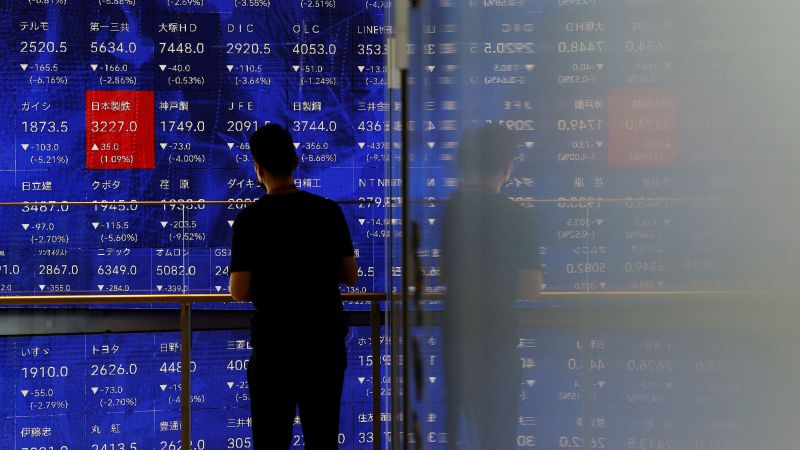Japan’s stock market suffered its biggest ever one-day loss on Monday as a global sell-off intensified following weak US jobs data.
The benchmark Nikkei 225 ended the day 4,451 lower, which is the biggest drop by number of points in history. The index finished more than 12% down, pushing its losses to 24% since early July. The index has now entered bear market territory, which is defined as a 20% pullback from recent highs.
Amid steep declines, trading was halted for short periods of time in Japan and South Korea. Circuit breakers, which pause trading amid strong volatility in an effort to prevent panic selling, were triggered multiple times in Tokyo and Seoul.
On Friday, the Nikkei closed down 5.8%, marking its biggest daily drop since March 2020, as traders fretted about the impact of a stronger yen on Japanese companies after the Bank of Japan (BOJ) signalled further rate hikes could be on the way. A rising yen would hurt exporters and companies with overseas earnings.
A rapid appreciation in the Japanese currency has also forced many market participants to unwind the yen carry trade, a hugely popular trading strategy. With interest rates having been extremely low in Japan for decades, many investors have borrowed cash cheaply there and converted it to other currencies and invested in higher-yielding assets.
Last week, the yen surged nearly 5% against the greenback. On Monday, it strengthened further, up 2.2% to trade at 143.3 per US dollar.
“This beefier yen set off a domino effect, triggering a global unwinding of carry trades,” said Stephen Innes, managing partner of SPI Asset Management.
From there, the market turmoil morphed into a “full-on avalanche,” propelled by a surprisingly hawkish turn from the BOJ, China’s economic pace slowing to a crawl and weak US tech earnings, he added.
Last week, the BOJ raised interest rates by 15 basis points to 0.25% in its second hike this year and announced plans to taper its bond buying. Traders expect more rate hikes to come later this year as the central bank tries to contain inflation.
China reported last Wednesday that its official manufacturing PMI fell in July, signalling continued weakness in factory activity.
In the United States, Amazon (AMZN) reported on Thursday an earnings miss for the second quarter and disappointing guidance for the third quarter. Intel (INTC), on the same day, reported an income loss of $1.6 billion in the second quarter and announced plans to slash 15% of its workforce to reduce costs.
Other Asia-Pacific markets also tumbled on Monday.
The Korea Exchange implemented circuit breakers to halt trading in the benchmark Kospi index briefly after it plunged more than 8%.
Taiwan’s Taiex ended down 8.4%, its worst day ever.
Australia’s S&P/ASX 200 lost 3.6%. Hong Kong’s Hang Seng Index and China’s Shanghai Composite were down 2.6% and 1.2% respectively.
Asian stocks tracked a sharp drop on Wall Street on Friday, where disappointing jobs data added to fears that the US economy is weakening. The Dow closed 1.5% lower, the S&P 500 lost 1.8% and the Nasdaq Composite declined 2.4%. The Nasdaq closed in correction territory, or more than 10% off its most recent high on July 10.
CNN’s Fear and Greed index, which measures market sentiment, has fallen to a “fear” reading of 27.
Other markets are also showing jitters. On Friday, oil prices settled at their lowest levels since January. Brent crude futures and US WTI crude were both down more than 3%.
Currently hovering around eight-month lows, oil prices may see some stability for the time being, despite threats of retaliatory action in the Middle East, according to Tom Kloza, global head of energy analysis at Oil Price Information Service.
“Beginning with the Hamas action last October 7, we are seeing mostly apathy when it comes to fears about a wider regional war in the Middle East,” he said.
“It would probably take an outright attack on Iranian soil to spark any real surge in prices due to geopolitics,” Kloza added. “It will take something quite dramatic to send oil prices scurrying higher and there is a strong desire in Washington to do whatever it takes to keep a lid on gasoline prices,” he said.
As far as domestic US gasoline prices, Kloza said a hurricane in the Gulf of Mexico may inspire a hike in prices. Debby has strengthened to a Category 1 hurricane ahead of making landfall in Florida.
This story has been updated with additional information.
Read the full article here









